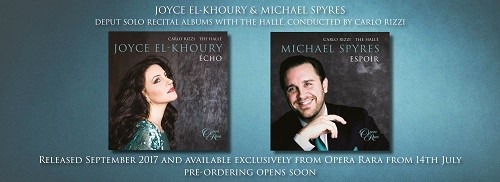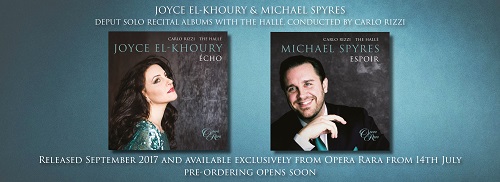 United Kingdom Various, Joyce El-Khoury (soprano) and Michael Spyres (tenor): The Hallé / Carlo Rizzi (conductor). Cadogan Hall, London, 14.7.2017. (JPr)
United Kingdom Various, Joyce El-Khoury (soprano) and Michael Spyres (tenor): The Hallé / Carlo Rizzi (conductor). Cadogan Hall, London, 14.7.2017. (JPr)

Auber – Overture to Manon Lescaut; Aria: ‘Ils s’éloignent’ (Le Lac des fées) – Michael Spyres
Rossini – Aria: ‘Venise, ô ma patrie’ (Othello) – Michael Spyres
Meyerbeer – Aria: ‘Robert, toi que j’aime’ (Robert le diable) – Joyce El-Khoury
Halévy – Aria: ‘Dans ces leiux… Quand renaîtra’ (Guido et Ginévra) – Michael Spyres; Duet: ‘Conduisez-moi… Ombre chérie’ (Guido et Ginévra) – Joyce El-Khoury and Michael Spyres
Verdi – Ballet music: ‘Air de Ballet, Pas de Quatre’ (Jérusalem)
Hérold – Aria: ‘Jours de mon enfance’ (Le Pré aux clercs) – Joyce El-Khoury
Donizetti – Overture to La Favorite; Aria: ‘Regnava nel silenzio’ (Lucia di Lammermoor) – Joyce El-Khoury; Ballet music: ‘Pas de Six’ (La Favorite); Duet: ‘Lucia, perdona… Se ad ora inusitata’ (Lucia di Lammermoor) – Joyce El-Khoury and Michael Spyres
Just a few months ago in February, Opera Rara recorded two recital discs; Espoir with tenor Michael Spyres and Écho with soprano Joyce El-Khoury, with the Hallé and conductor Carlo Rizzi. The singers are described in the programme as ‘valued members of our artistic family’ by Opera Rara’s chief executive, Henry Little, and can be heard on its recording of Donizetti’s Les Martyrs (conducted by Sir Mark Elder) and reviewed in concert here. The pair of new CDs builds ‘a bridge between two great singers of the 19th century and two of the great singers of the 21st’. They include repertoire – mainly French arias – associated with two of leading bel canto singers of their time Gilbert Duprez (1806-96) and Julie Dorus-Gras (1805-96).
Duprez was apparently the first ‘modern tenor’ pioneering powerful chest-voice high Cs in 1837 performances of Rossini’s Guillaume Tell. He is also famous for creating the role of Edgardo in Donizetti’s 1835 Lucia di Lammermoor. Dorus-Gras had particular success in Meyerbeer’s Robert le diable and Halévy’s La Juive. Intriguingly she also sang the title role in Lucia di Lammermoor in London in 1847-8 with Berlioz conducting. Performances with Duprez included Halévy’s Guido et Ginévra, Berlioz’s Benvenuto Cellini and Donizetti’s Les Martyrs, and this is mirrored by El-Khoury and Spyres duetting on each other’s CDs.
Espoir and Écho are clearly well worth exploring and are currently available exclusively on the Opera Rara website (click here) and are on general release from September. For this concert at the Cadogan Hall, Joyce El-Khoury, Michael Spyres, Carlo Rizzi and the Hallé performed music from these CDs and celebrated repertoire rarely heard in London, if at all, since there were apparently three UK premieres amongst the extracts from operas by Auber, Rossini, Meyerbeer, Halévy, Hérold, Rossini, as well as, Verdi and Donizetti.
Some of the plots have to be read to be believed, such as Auber’s Le Lac des fees, where the leading character Albert and fellow students find an enchanted lake, see swans transformed into fairies, and – as they do in these sort of operas – Albert falls instantly in love with one, Zéïla. However, El-Khoury and Spyres’s concert made me forget all this nonsense and was a peerless showcase of the beauty of the human singing voice and – almost literally – what heights it can aspire to.
Given the vocal pyrotechnics demanded by the singers’ arias and duets it was not surprising that Rizzi and the Hallé played some addition overtures and ballet music to fill the programme, which had been curated by Opera Rara’s repertoire consultant, Roger Parker, and his colleague Rosie Ward. Much of this ‘filler’ music outstayed its welcome and the overtures (Auber’s Manon Lescaut and Donizetti’s La Favorite) were no more inspired than any routine twentieth-century ‘curtain-raiser’ to a Broadway musical. Intriguingly we could read how Wagner was employed in Paris to provide a piano reduction of La Favorite and that he may have ‘borrowed’ the second, climatic melody for Der fliegende Holländer …if he did I couldn’t hear it on this occasion. The ballet music by Verdi (Jérusalem) and Donizetti (La Favorite) also did not reveal either composer to be at their best. Ballet scenes were obligatory for any work at the Paris Opéra – as Wagner found out so infamously with Tannhäuser in 1861! The Hallé seemed around 70 strong crowded on the small Cadogan Hall platform and under Carlo Rizzi’s urging, ambidextrous baton, provided wonderful support for El-Khoury and Spyres. There were many fine instrumental solos, especially from Gareth Small’s mournful trumpet during the Halévy aria and Simon Blendis for the Hérold one.
Michael Spyres has an interesting voice with a remarkable range that was immediately on display in the opening ‘Venise, ô ma patrie’ from Rossini’s Othello. There was a baritonal quality to the lower notes and the highest ones (Ds?) pinged but were never thrillingly full-throated. Often during the evening he seemed to venture into even higher territory that must have made dogs surrounding the Cadogan Hall prick up their ears. There was greater refinement in Halévy’s aria ‘Dans ces leiux… Quand renaîtra’ which revealed Spyres’s impeccable bel canto line – especially in the middle of his voice – as Guido mourns Ginévra in the opera which is named after them. For Auber’s ‘Ils s’éloignent’ (Le Lac des fées) Spyres was suitably agitated verging on the delirium with which the aria ends as Albert wants to be set alight. That is 1830s’ opera for you! Later in the evening Rizzi announced the encore saying not all the works hidden in the vaults of the Milan Conservatory are ‘masterpieces’ and this might be one of those.
As fine as Spyres was, the most accomplished singing was from Joyce El-Khoury despite the announcement she was recovering from a summer cold. It may just be me but I prefer a ‘coloratura soprano’ to a ‘coloratura tenor’. Another reason is that El-Khoury reminds me of another great soprano – not Dorus-Gras as I am not that old! – but a young Angela Gheorghiu who she looks and sound like. Of course, I mean this as the highest compliment. There was vocal finesse and dark, rich, expressivity to all El-Khoury sang. This was allied to gracious and subtle phrasing, as well as, all the necessary agility and stratospheric high notes for this repertoire. Only occasionally did the vocal line lose out to the after-effects of her cold, such as, during the opening lines of Isabelle’s aria from Robert le diable. (Strangely this muted singing made her sound even more like Gheorghiu.) At more emotive moments in this aria – and later during Lucia’s ‘Regnava nel silenzio’ – there was something visceral about how open, free and powerful her voice was. In comparison Hérold’s ‘Jours de mon enfance’ from Le Pré aux clercs was more lowkey, gentler, and like a duet for soprano and violin.
Since – as previously mentioned – Duprez frequently sang opposite Dorus-Gras, the duets from Spyres and El-Khoury were perhaps the highlights of this fine concert for me. Before the interval there was the Act IV duet from Guido et Ginévra another opera that no one might consider a masterpiece despite Halévy’s early use of leitmotifs. The scene opens with a reminiscence of Guido’s romance melody we had heard in Spyres’s aria from the opera. It is another convoluted plot and Ginévra is not dead but Guido is mourning because he believes she is. When Ginévra revives he thinks she is a ghost before they have a duet! Spyres was sorely tested by Halévy’s tessitura, though together with El-Khoury they made it all sound a lot better than it probably is. Their wonderful technique shone through the Act I duet ‘Lucia, perdona… Se ad ora inusitata’ from Lucia di Lammermoor when Spyres and El-Khoury were able to create a sense of character and bring out some drama actually present in the music they were singing. Their encore was the Act IV duet from Les Martyrs (to be heard on the Opera Rara recording) and it was a fitting conclusion to this tribute from great singers of one generation to those of the past.
Particularly if like the grandstanding style of French grand opera of the early part of the nineteenth century, the CDs and this concert would be just for you. For me I prefer the later verismo operas and ‘music dramas’.
Jim Pritchard
For more about Opera Rara click here.
